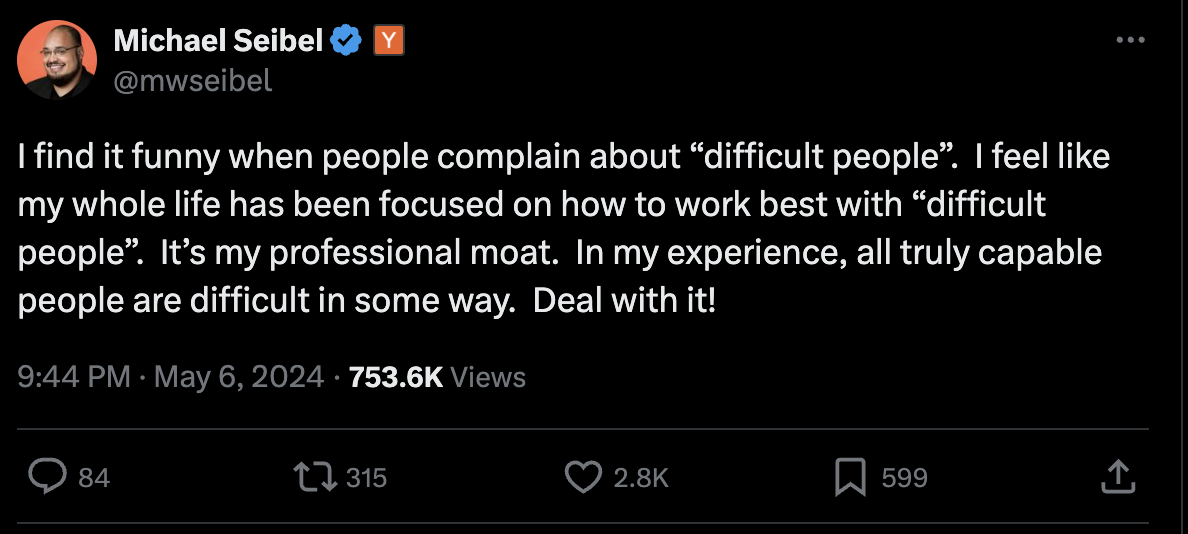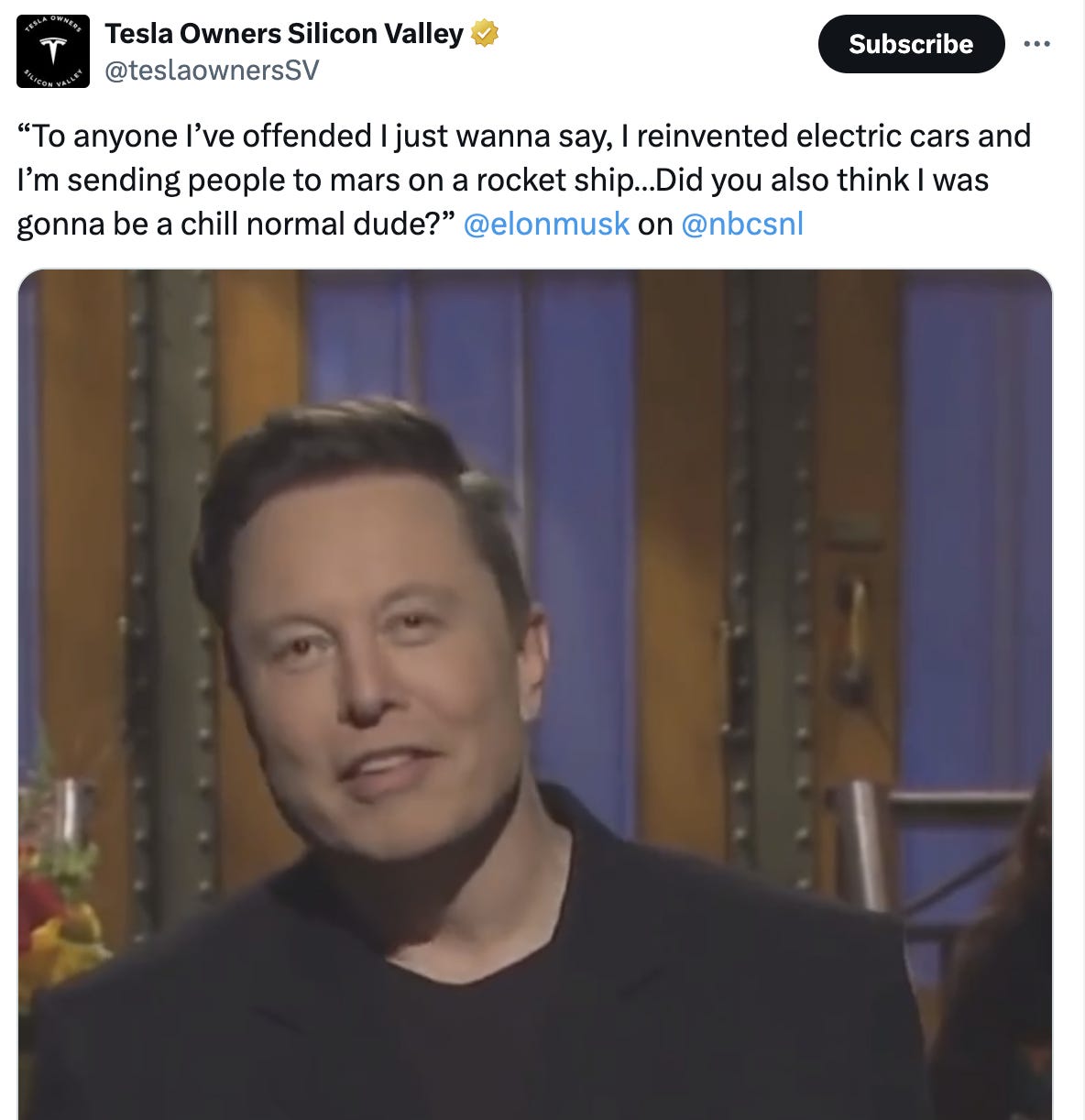The Pattern Breakers book is now available wherever you buy your books.
Last week the notion of “disagreeable” or “difficult” people caught the attention of the twittersphere, with a timely comment from Michael Seibel, barely a week after our podcast with him dropped.
Throughout my career as a startup founder and investor I’ve been intrigued by the question of whether startup founders tend to be more “disagreeable” than most people. Many people who I respect a lot would argue this is true. In 2019, Marc Andreessen even went so far as to say that the 21st century is the “century of disagreeableness.”
In this piece, I will explore what I’ve noticed about the relationship between disagreeableness and pattern-breaking actions that often lead to success in startups. I’m going to use some examples of successful startups where I had an up-close view at the time, such as Lyft, Okta, Microsoft,
Disagreeableness - Defined
I define disagreeableness in the context of the “big five” personality traits often discussed in the fields of psychology and neuroscience. These attributes include openness to new experiences, conscientiousness, extraversion, agreeableness, and neuroticism. This model, often abbreviated as OCEAN, is a widely recognized method for understanding individual personalities.
According to the OCEAN model, individuals who are high in the agreeableness personality trait are generally warm, friendly, and tactful. Those who are low in agreeableness are considered disagreeable. They often display skepticism, competitiveness, bluntness, low empathy, low concern for social harmony, and more independence in thinking and behavior.
Let’s talk about when the traits of disagreeableness can be an advantage.
Lyft: Beware…the Conformity Trap
In numerous posts, I’ve talked about how insights protect us from falling into the comparison trap. Disagreeableness guards against another potentially fatal outcome - the conformity trap. The comparison trap happens when people fall into the temptation to think like others. The conformity trap tempts people to act like others by seeking approval and status in a way that detracts from achieving the mission.
Lyft founders Logan Green and John Zimmer understood this well. They initially bypassed asking permission from San Francisco authorities to launch their ridesharing service. They knew that to ask for permission before launching would almost certainly have resulted in a “Hell no” as a response from the local authorities. Instead, Lyft focused on launching something customers would passionately love. By showing that banning the service would deprive citizens of something they already thought was awesome, Lyft’s talks with local authorities were far more productive. Seeking permission or adhering to usual rules might have caused less disturbance for the founders but such a choice would have surely betrayed their mission.
Avoiding the conformity trap isn’t easy.
From a biological perspective, we are hardwired to chase approval of our peers. By being more agreeable and fitting in, we promote harmony and reduce conflict. We’re less likely to feel the sting of rejection. And it takes less cognitive effort to go with the flow. Without consciously realizing it, our internal voices constantly pressure us to conform when we doubt our ideas and abilities or worry about how we will be judged by others.
Microsoft: Confrontation, not Congeniality
Traditional views of business leadership often emphasize a gentle, harmonious approach: be slow to criticize, generous with praise, and seek consensus. Yet, history tells us that many transformative leaders would beg to differ.
Bill Gates at Microsoft epitomized this style of leadership. He fostered a culture of sharp intellect and high expectations, turning meetings into arenas where he would challenge his team, demanding precise answers and thorough preparation. While this method stirred tension, it proved highly effective, driving his team to exceed expectations and excel.
A few weeks ago, I wrote about the Acquired podcast's episode on Microsoft. It really made me smile because it brought back memories of my father’s time there in the late 1980s and early 1990s. By then, I was in college and saw my parents only during the summers of my junior and senior years in Seattle.
Occasionally, my dad would say, "I have a 'Bill Review' tomorrow." I knew that meant he would disappear into his cluttered office for the next night or two. I wouldn’t see him until it was over. He prepared for these meetings with an urgency that seemed far beyond reasonable.
But here’s the thing: I don't remember him ever complaining. Quite the opposite. He often said of Bill, “He works harder than anybody.” He didn’t think Bill worked needlessly hard, just that he was more committed to winning than anyone he'd ever met. My father was inspired by preparing for a "Bill Review"; he knew it drew out his best.
Other leaders like Steve Jobs, Elon Musk, and Jeff Bezos have similarly broken the mold of conventional leadership. They've shown that a willingness to engage in tough discussions and push people to their limits can lead to significant breakthroughs. These leaders demonstrate that true motivation often stems from authentically facing challenges head-on.
Okta: Getting to No
Two prevalent myths in business are that the customer is always right, and team harmony is always beneficial.
Okta’s experience offers a valuable counterpoint, highlighting the strategic advantage of being able to say no when it aligns with broader business goals.
In a recent post, we talked about how Okta focused its early efforts on satisfying the needs of early adopters of cloud computing. Early in its development, many prospective customers asked for integration with legacy and on-premises applications. But founders Todd McKinnon and Freddy Kerrest crafted their product exclusively for cloud identity management, and they opted to work only with customers who shared this forward-looking vision.
Saying no to things that aren’t the best uses of resources might seem obvious, but keep in mind that when you are in the early days of a startup, you spend most days hearing why your idea isn’t going to work or you see that most people don’t even care about what you are doing in the first place Suddenly you encounter people who are excited, if only…you do something that you initially thought was not additive to the strategy. Shouldn’t your startup want to book the win? Doesn’t it need to generate revenue before it runs out of runway? All of these concerns can loom large in those early lonely days of quiet desperation and uncertainty.
Todd and Freddy understood that saying yes for the wrong reasons would distract them from pursuing their vision in a focused way. Their steadfastness not only maintained the product’s integrity but also attracted customers who were aligned with their forward-thinking vision and could co-create the future with them. This was not stubbornness; it was a deliberate strategy to prioritize discipline and integrity with their early customers.
When disagreeableness crosses the line
But there’s a catch, and it’s an important one: Some abuse the narrative of disagreeableness to justify destructive behavior, calling their actions “authentic.” This distorts the idea of true courage, confusing rudeness for resolve, cruelty for candor, and narcissism for noble intentions. These people rarely succeed, and if they do, it’s despite these flaws rather than because of them.
In other words, just because you confront people, it doesn’t mean you’re Steve Jobs or Bill Gates. I’ve seen too many people adopt the style of their abrasive traits without embracing the substance of what made them effective - clarity and integrity of vision, focus, and radical candor. Often people hide behind the shield of claiming to be authentic when in fact they are just exercising poor leadership and immaturity. Not surprisingly, this type of leadership usually doesn’t lead anywhere good. It usually ends up in the wreckage of broken teams, conflict that never gets resolved, and ultimately a failed attempt to make any meaningful impact.
Finding your balance
Do you naturally seek harmony and risk conformity? Or is your demeanor more challenging, possibly edging into the destructive? Regardless of your natural tendencies, I strongly advocate starting your entrepreneurial journey with a top-tier executive coach. A skilled coach can guide you toward a strategic form of disagreeableness that aligns with your mission. You want brutally honest feedback, someone who acts as a mirror to reflect your strengths and blind spots. Addressing these blind spots is essential for achieving greatness. The right coach can be indispensable.
What this means for you
Agreeableness, for all its social graces, seldom shatters molds or changes the future. Breaking patterns calls for a bit of disagreeableness.
1. Excessive agreeableness is not authentic. Agreeing for the sake of getting along with others, when it goes against your internal beliefs, is another form of insincerity.
2. Excessive disagreeableness is not authentic either. Authenticity, at its core, involves a balance between standing by your principles and being open to new ideas. Being contrarian for its own sake, is a type of conformity that reacts against the thinking of other people.
3. Disagreeableness buys freedom. Perseverance and conviction keep your non-consensus idea whole and inspire others to join your movement. The more you seek approval from others, the less free you will be to pursue the remarkable.
4. The more disagreeable you are, the lonelier your existence. Disagreeableness can be a spark that ignites revolutions. Yet that same spark can burn bridges that connect us to conventional community and friendship.
Talk of disagreeableness in founders is common, yet detailed written examinations are rare. I aim to sharpen my understanding of what matters most and what doesn't. Thanks for reading and let me know your ideas for how to refine these ideas further.









I have the clarity of vision and commitment to avoid the conformity trap, but I am not sure that I posses the level of disagreeableness of the leaders that you cite. I am not the nicest guy, but probably nicer than them. I am left wondering if I will challenge my team in the same manner.